Dental Implants – Lakewood, Dallas, TX
A Permanent Solution to Tooth Loss
Ask any dentist around the world what they consider to be the best way to replace missing teeth, and they will all tell you dental implants. These prosthetics are practically indistinguishable from real teeth, and after getting them, you’ll feel like your teeth never went missing in the first place. Thankfully, the team at Dental Center of Lakewood is ready to provide everything you need for this treatment so you can renew your smile and start enjoying it as soon as possible. To get started, contact us today to schedule a consultation to discuss tooth replacement with dental implants in Lakewood, Dallas, TX.

Why Choose Dental Center of Lakewood for Dental Implants?
- Entire Procedure Completed Under 1 Roof
- Able to Replace Any Number of Teeth for Life
- 100% Custom-Made Restorations
What is a Dental Implant?

If you were to look at a dental implant, you’d probably think, “That doesn’t look like a tooth!” That’s because an implant is actually a prosthetic tooth root that is placed directly into the jawbone. Made of titanium, it fully bonds with the nearby bone, and this is used to support a crown, bridge, or denture up top. Right now, implants are the only procedure available that restores 100% of a tooth.
Start-to-Finish Convenience

While other dental offices in the area will send you running all over Texas to have the implant procedure completed, we’re able to handle everything ourselves at Dental Center of Lakewood. From your initial consultation to placing your new roots to attaching your new teeth, you’ll work alongside our friendly and experienced team, helping you achieve gorgeous results while enjoying peace of mind throughout the entire process.
The 4-Step Dental Implant Process

Dental implants involve a more complex process for restoring missing teeth compared to dentures and dental bridges. While the treatment usually takes several months to finish, the numerous life-changing benefits to your smile and oral health will certainly make it worth the investment. Furthermore, our team performs the entire process in-office, so you won’t have to worry about being referred to someone else to undergo your procedure. Read on to learn the four major steps when it comes to getting dental implants in Lakewood.
Initial Dental Implant Consultation

To begin the process, you’ll undergo an initial consultation with our team so that we can assess your oral health, discuss your smile goals, and determine if dental implants are the best solution for you. We’ll also explain how the process goes as well as the overall price of your treatment. If we find any underlying or developing oral health issues, we’ll need to address them before moving forward with your procedure. Our team can offer preliminary treatments to get your mouth back in shape, such as gum disease therapy, bone grafting, and tooth extractions.
Dental Implant Surgery
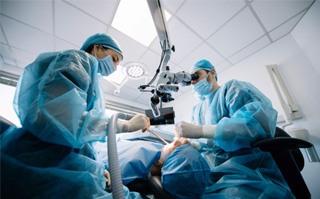
At the beginning of your appointment, your dentist will ensure that your mouth is completely numbed with a local anesthetic, that way you remain pain-free throughout your entire procedure. We’ll also likely provide you with sedation dentistry to help you stay relaxed and experience a more pleasant visit. Once you’re comfortable, we’ll start by making a tiny incision in the gum line to access the jawbone. Your implants will be strategically placed at their precise angles before we suture the gums around them. We’ll top the metal posts with protective caps to keep them safe while you heal.
Dental Implant Osseointegration & Abutment
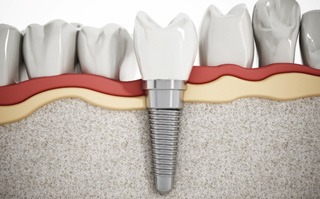
Over the next few months, your implants should undergo a process called osseointegration, which is when the jawbone fuses with the metal posts. This is what provides the sturdy foundation necessary for your restorations to feel natural, allowing you to regain 80% or more of your chewing power. Once this process is complete, you’ll come back to our office to receive your abutments.
Delivery of Dental Implant Restoration(s)

After your gums have recovered from getting your abutments, you’ll return to us so we can place your new dental crown, bridge, or denture. We’ll verify that the restorations match your smile and that your bite is comfortable, making any necessary minor changes. Once we’ve confirmed that your results are satisfactory, you’ll be free to go and enjoy your new smile!
Benefits of Dental Implants

It’s hard to overlook the many benefits of dental implants in Lakewood. From the natural appearance that causes them to blend in with your existing smile to their longevity and ability to provide greater bite force and chewing power, it’s easy to see why so many people (millions) are happy they chose dental implants to replace their missing teeth. These permanent prosthetics are unlike any other tooth replacement solutions on the market, which is why it’s time for you to review the following advantages you can expect once you receive your dental implants. Contact us with any additional questions you might have.
Day-to-Day Benefits

- Security: Implants enable a patient to speak confidently and eat whatever they like because the teeth never shift or slip out of place.
- Renewed Confidence: Each implant root is topped with a custom-made restoration, and because implants don’t have obvious attachments, they blend into any smile to boost someone’s appearance as well as their oral health.
- Embrace Life: A person can freely live their life to the fullest because of the enhanced aesthetics and boosted confidence offered by dental implants in Lakewood. Unlike denture-wearers who are often embarrassed by their smile, implants make it possible to engage with others freely.
Health Benefits
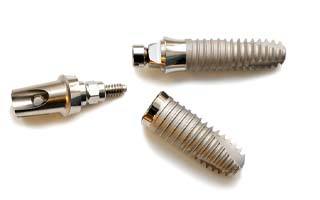
- No Anchoring Teeth: Existing teeth remain untouched since dental implants are secured to the jawbone and not anchored to natural teeth.
- Better Oral Health : Over time, tooth loss can cause the jawbone to weaken; however, dental implants provide continuous stimulation to the bone, making it possible to avoid facial collapse or sagging.
- Regular Teeth Stay in Place : A person with dental implant does not need to worry about dental drift because their healthy teeth will replace firmly in place. This reduces the risk for orthodontic treatment as a result of healthy teeth attempting to fill in the gap of a person’s smile.
- Improved Overall Health: Tooth loss is a known reason for many systemic issues (i.e., osteoporosis, heart disease, diabetes, etc.). By replacing teeth with dental implants, the risk for these problems is reduced.
Long-Term Benefits

- Successful Implant Placement: The expectation of a person’s dental implant placement success rate is estimated to be around 95% as long as the individual seeks the help of a trusted implant dentist in Lakewood .
- Made to Last: With minimal maintenance (regular brushing, flossing, and dental checkups), an implant can be trusted to last for about 30 years, which is multiple times longer compared to traditional bridges and dentures.
- More Money in Your Pocket: Dental implants do not require the same financial maintenance than dentures and dental bridges do. A person won’t need to buy denture adhesive, special cleaning supplies, or go in for regular adjustments or replacements.
Who Dental Implants Can Help

Whether you’ve lost one, several, or all of your pearly whites, dental implants can be the incredibly reliable solution you’ve been looking for. To know for sure if this treatment is right for you, our team will need to thoroughly evaluate your oral health, especially your gums and jawbone to verify that they’re strong and healthy. We can also help address any complications such as periodontal disease or insufficient jawbone density with preliminary treatments to ensure a more successful procedure. Your results will also be completely personalized to fit your specific needs, and we’ll work closely with you every step of the way. Until then, here’s how to tell if you dental implants can help you.
Who Is a Good Candidate for Dental Implants?

Almost any patient with missing teeth can be a good candidate for dental implants as long as they have a relatively healthy mouth and enough strong jawbone to hold the new roots. Even if you don’t meet the initial requirements, our team can recommend treatments like gum disease therapy and bone grafting to help get you back to good oral health before moving forward with your procedure. Once both of these have been confirmed (or achieved if a patient needs treatment), our team can help a patient select which type of implant procedure would best suit their needs.
Missing One Tooth

A lone space can be filled with a dental implant attached to an all-porcelain crown. Since the metal post will be embedded into your jawbone, it’ll serve as your new permanent tooth root for an exceptionally natural-feeling and stable foundation. This approach is also more conservative compared to a dental bridge, as getting an implant doesn’t require the teeth next to the missing one to be reshaped and filed down. Furthermore, the titanium post will effectively stimulate your jawbone, preserving its strength and avoiding potential future tooth loss.
Missing Multiple Teeth

A patient doesn’t have to get an implant for every single tooth that is missing. A bridge or partial denture can be secured to the jawbone using a small number of implants, bringing back several teeth at once. This method can also help maintain your remaining natural teeth, as your new restorations won’t need them for support.
Missing All Teeth

Four to six implants can be used to attach a full denture inside the mouth and ensure it never moves out of place. We can provide a patient with a completely new prosthetic, or we can even upgrade someone’s current dentures so they fit over implants and gain extra stability. With this treatment, you’ll be free to enjoy more dietary choices, as you’ll regain 80% or more of your natural chewing power.
Learn More About Implant Dentures Learn More About All-On-4 Dental Implants
Understanding the Cost of Dental Implants

Every dental implant procedure we provide has to be customized to deliver the best possible outcome, and because of this, the final cost is always different from patient to patient. Generally, the more implants someone needs, the more expensive the procedure. Thankfully, implants are extremely durable and are considered one of the best long-term investments in dentistry because they have been shown to last decades longer compared to other replacements.
Preliminary Treatments & Dental Implant Surgery

If you have gum disease, you’ll need to receive treatment for it ahead of your dental implant placement. Additionally, if a tooth needs to be removed in order to place the implant or nearby teeth need removal to make room for a larger restoration (such as a bridge or denture), this will be done ahead of time. As a result, your costs will be higher. Anesthesia to numb any sensations felt during treatment also has its own fees. While surgery also has its own unique costs, we complete the whole process in-house, so you can expect your fees to be more compact, convenient, and easier to understand.
The Parts of Your Dental Implant

The more dental implants you need to rebuild your smile, the higher your overall costs will be. Furthermore, implants made from titanium vs. zirconia tend to have their own price tags as the materials are different. Much like cars or other highly complex products, certain models and makes of implants can last longer or function better than others. Our office remains committed to being as transparent as possible when it comes to the materials we use and the manufacturers we partner with.
Final Dental Implant Restoration

Dental implant treatment is highly customizable, and the restoration used to cover the implant holds no exception. There are four main types of restorations that can be used on implants, including crowns, bridges, partial dentures, and full dentures. The more implants you need to replace teeth, the more complex your restoration will be. This directly influences the cost of your treatment, especially if you have severe tooth loss. However, restorations designed to replace many teeth will not need the same number of implants to restore your smile (i.e. 4 to 6 implants can generally hold a full-arch implant denture.)
Does My Dental Insurance Cover Dental Implants?

In most cases, dental implants are still considered “cosmetic” by insurance companies, making them ineligible to receive coverage. Of course, our team will always go over your plan in greater detail as we have years of experience in helping patients maximize benefits. For example, some portions of your care (such as the restoration or preparatory treatment to receive implants) can receive partial coverage.
Making Dental Implants Affordable

Even if you don’t have dental insurance or your plan doesn’t provide coverage, there are other options available to you worth exploring. For example, our office welcomes you to learn more about CareCredit, a third-party financing option that allows for monthly installments to be made on treatments like dental implants.
Dental Implant Failure & Salvage
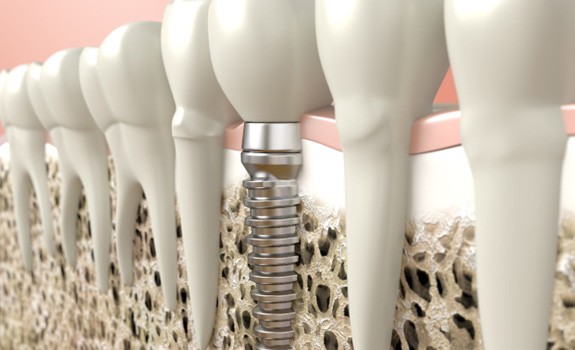
Dental implants have an amazing success rate of over 95%! However, there is still a very rare chance that you could experience a dental implant failure. If you notice any discomfort or if something doesn’t seem right about your replacement teeth, don’t hesitate to reach out to us. We may be able to restore your smile with a dental implant salvage treatment!
Learn More About Dental Implant Failure & Salvage
Dental Implants Post-Op Instructions
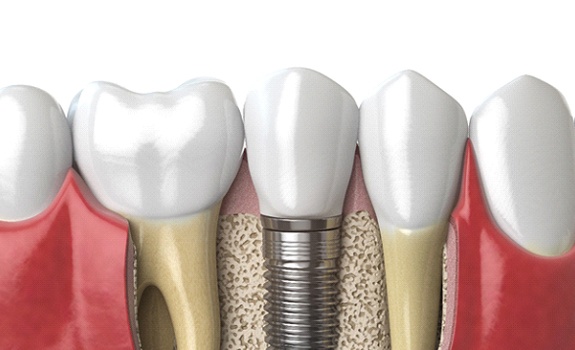
Since Dr. Spillman handles the entire dental implant process from start to finish in-house, he can provide you with the post-op instructions you need for a smooth, speedy recovery following dental implant placement. Below, you can find basic instructions for what to do after implant surgery. This is just a general outline. Additional steps may be needed based on your oral health. Remember that you can always contact our office if you have any concerns.
What to Do Directly After Dental Implant Surgery

Implant surgery does take some time to fully recover from, but as long as you’re taking proper care of your mouth, your mouth should be able to heal itself quickly without complications. One of the most important things you can do is protect the blood clot that forms on your surgery site so that your gums are able to heal properly. This means refraining from spitting, drinking through straws, smoking, touching the implant site, or any other behaviors that might end up dislodging the clot.
Common Side-Effects

Normal side effects of dental implant placement include gradual and intermittent bleeding around the surgical site, swelling that can last over a week, and general discomfort. We’ll give you a timeline for how long these symptoms should last as well as tips for dealing with them. (For example, your discomfort can be alleviated with prescription or over the counter pain medication.) Don’t hesitate to call if these side effects last longer than they should or don’t seem to be improving over time.
Diet

Trying to eat solid foods while your mouth is still healing could injure the recovery site or dislodge the blood clot. To avoid that, you must follow a soft food diet filled with nutritious foods such as mashed potatoes, yogurt, ice cream, pudding, soup, and scrambled eggs. It should only take a few days for your mouth to heal to the point where you can go back to your normal diet as long as you don’t chew directly on the implant surgery site.
Health & Oral Hygiene

You need to keep the area around your dental implants clean while the gums are still healing. It’s okay to brush your teeth like you normally would, but be very gentle when you’re cleaning the area around the implant. You can manage bacteria levels in your mouth by rinsing with salt water to or three times every day. Mouthwash can help as well as long as it doesn’t contain any alcohol.
What to Do After Your New Teeth Are Attached

New teeth can be attached to your dental implants once they have fully joined with your jawbone. Your gums might be temporarily sensitive after the restoration is placed. You can manage this issue with pain medication. There shouldn’t be any swelling or bleeding at this stage, so if you notice such symptoms, call us immediately.
Maintaining & Caring for Your Dental Implants

Dental implants are designed to last for many decades, and in some cases, they can even last for the rest of a patient’s life. As with natural teeth, though, the lifespan of your dental implants depends on how well you care for them. The more effort you put toward dental implant care in Lakewood, the longer you can expect to enjoy your new pearly whites. Luckily, implants don’t require a complex, time-consuming maintenance routine like dentures do. You can take care of them very easily by following these five simple steps.
Prioritize Your Oral Hygiene

Neither your dental implant nor the restoration that sits on top of it can decay like real teeth, but the gum tissue supporting them could become infected without daily oral hygiene. This might cause dental implant failure. To prevent this, brush and floss your implants every day, just as you would natural teeth.
Eat a Healthy Diet

Your oral health is influenced by the foods you eat just as much as it is by your dental hygiene. Foods that are high in sugar or starches can give the bad bacteria in your mouth the energy they need to create plaque acids, which can cause decay in your remaining teeth and infections in your gums. It’s fine to treat yourself every now and then, but make sure your diet primarily consists of mouth-healthy foods like fruits, vegetables, and calcium-rich dairy products.
Break Bad Habits

Despite being durable enough to last for a lifetime, dental implants are NOT indestructible. In fact, many of the same harmful habits that damage natural teeth could also wreak havoc on your implants and/or restorations. These habits include:
- Biting your nails
- Smoking, vaping, or chewing tobacco
- Eating ice
- Chewing on pens, pencils, or other hard inedible items
If you’re struggling to quite one or more of these habits, please reach out to us. Our team would be happy to point you toward the appropriate resources.
Protect Your Dental Implants

Regular exercise is important for your overall health, but if you don’t wear a mouthguard when you play sports, you could be jeopardizing your smile in the process. The last thing you want after replacing your missing teeth is for a sudden injury to knock out your dental implants and send you back to square one. Wearing a customized mouthguard can shield your pearly whites and minimize the damage in the event of an impact. Similarly, wearing a nightguard if you tend to grind your teeth while sleeping can help you avoid long-term strain on your implants and remaining teeth.
Schedule Regular Dental Checkups

Attending two dental checkups and cleanings per year is still important no matter how many natural teeth you have left. These routine visits let our dentists catch small problems with your implants in their early stages. That way, if they detect an issue, they can treat it with conservative and cost-effective methods.
Dental Implant FAQs

Dental implants are an incredible dental technology because they mimic teeth like no other tooth replacement can. But we understand if you have hesitations if it’s the first time you’re hearing about them. Our goal at Dental Center of Lakewood is to help you become as informed as possible ahead of your procedure, so please take a brief moment to read over some of the most common questions we’ve heard over the years about dental implants! If you have other concerns, please let us know at your consultation.
Does Getting Dental Implants Hurt?
Your mouth will always be sufficiently numbed using a local anesthetic before we begin surgery. Keep in mind that your jawbone does not have any nerve endings, so you should not notice any sensations as we modify your bone tissue to receive your implant. If you’re feeling anxious about treatment, we can also administer a sedative to help you stay calm and relaxed during your procedure. Surgery itself will not hurt, but it is normal to experience some discomfort afterwards. To get relief, you can take prescription painkillers as needed and use a cold compress to bring down swelling that appears. You should fully recover after a few days.
Do Dental Implants Make You Look Younger?
They absolutely can! When you bite down and chew food, this force spreads throughout the roots of teeth and stimulates your jawbone. If teeth are missing, your jawbone begins to lose that stimulation and deteriorates. If the jawbone cannot support the facial structures like it used to, your face can eventually appear more wrinkled or sunken in appearance. It’s normal for fine lines to begin forming around your mouth. To this day, dental implants are the only type of replacement teeth that actively stimulate the jawbone and prevent atrophy, a common side effect of aging.
Will People Be Able to Tell That I Have Dental Implants?
Our dentists will capture digital impressions of your mouth, then use this data to create your personalized restorations. The restorations are color-matched to blend in with your neighboring teeth as closely as possible. After the restorations are placed, whether they are implant crowns, bridges, or dentures, no one around you should be able to tell the difference.
Can I Get Dental Implants If I Have Osteoporosis?
Some of the most common side effects of osteoporosis include fragile and porous bones, which can directly impact the health of your jawbone. As a result, your jawbone may not be strong enough to support dental implants, at least not initially. With a bone graft, you may be able to strengthen the bone enough so it can receive a dental implant. We’ll go over your overall health status and determine if your condition or medications you are taking prevent you from starting treatment. For example, bisphosphonates can slow down healing of the jawbone after implant surgery. See if you can stop taking this medication temporarily by speaking with your doctor. For best results, we may recommend placing dental implants immediately after teeth are removed.
Are Dental Implants Safe?
As with any type of dental procedure, dental implant placement is much safer when you have a trained, knowledgeable professional performing it. Our team can complete the dental implant process in-office and will exercise the utmost caution during the planning stages in order to keep risks to a minimum.
During your initial consultation, we’ll let you know if you have any medical conditions – such as diabetes or cancer – that could make the implant process riskier for you and go over the steps we can take to ensure your safety.
What Can Cause Dental Implants to Fail?
As reliable as dental implants are, they may fail for a number of reasons. The most common issue is peri-implantitis, an infection that affects the bone and gums around the implant posts, causing them to weaken over time. Eventually, your implants could become compromised due to the lack of healthy tissue to support them.
Failed osseointegration can also be an issue. If there’s not enough bone density in your jaw, your dental implants may not be able to properly bond with the tissues around them.
Additional risk factors for dental implant failure include grinding your teeth every night, poor oral hygiene practices, and specific medications. We can give you an overview of the factors that can lead to dental implant failure as well as what you can do to keep your new smile safe.
Am I Too Young or Too Old to Get Dental Implants?
Dental implants typically aren’t recommended for anyone under the age of 18, and certain patients may not be able to have it performed until their mid-20s. This is because placing dental implants too soon could affect the development of the jawbone. In order to avoid problems, it’s better to wait until the jaw is finished growing.
Technically, you can never be too old for dental implants; the treatment can be performed on adults of all ages. That being said, older patients are more likely to have health issues that can potentially get in the way of dental implant placement. Be prepared to talk about your medical history during your dental implant consultation.
Will I Have to Take Time Off Work for Dental Implant Surgery?
Most likely, yes, but it may not be as much time as you’re expecting. Many patients are able to return to work just one or two days after dental implant placement. That said, you do need to avoid heavy exercise for a while if you want to keep the healing process on schedule; it’s therefore better to plan on staying home for three or four days if you have a job that involves a lot of physical labor.
If you’re worried about taking too much time off work, it may be a good idea to schedule your dental implant surgery on a Thursday or Friday. That way, at least some of your expected recovery time will fall on the weekend.
